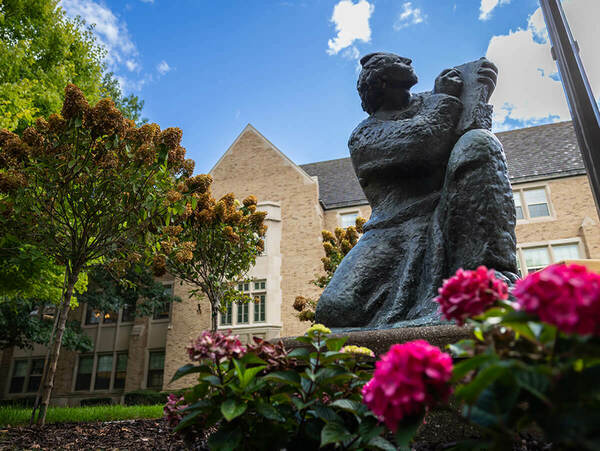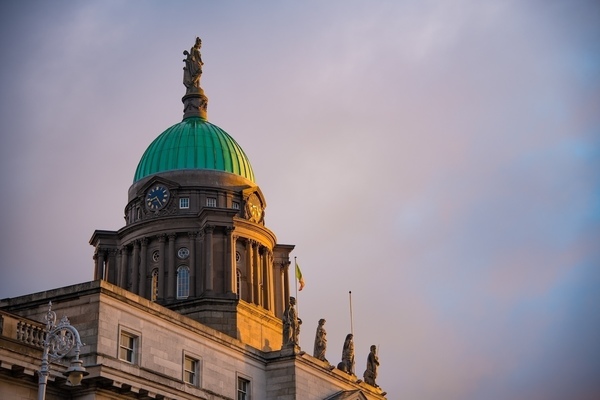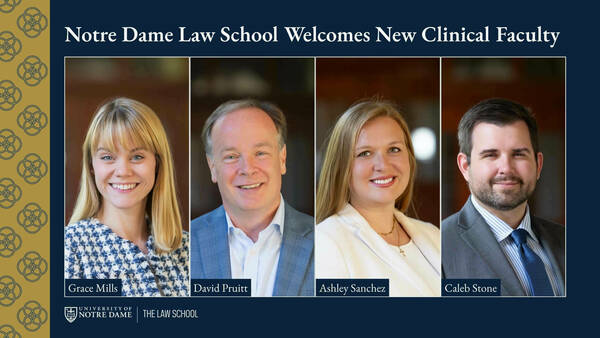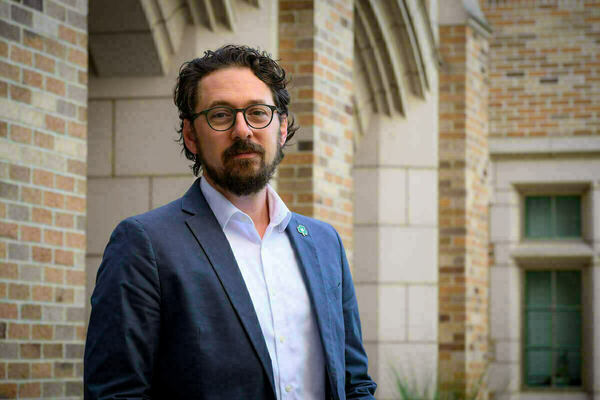Six early-career scholars join the inaugural Provost’s Postdoctoral Fellowship Program.
Six interdisciplinary scholars have joined the College of Arts & Letters at the University of Notre Dame to continue their research, obtain invaluable support, and engage in professional development as part of the inaugural Provost’s Postdoctoral Fellowship Program.
Launched in spring 2025, the postdoctoral program provides financial, research, and mentorship support for exceptional scholars across an array of fields. The program — which also includes scholars in the College of Science and College of Engineering — developed out of the commitment in Notre Dame 2033: A Strategic Framework to become the world’s leading Catholic research university, and it is supported by the Office of the Provost, the Graduate School, and the Office of Postdoctoral Affairs.
Led by Katie Bugyis, the Rev. John A. O’Brien Associate Professor in the Program of Liberal Studies and the College’s director of postdoctoral studies, the six Arts & Letters postdocs will each receive a generous stipend, research support, mentorship, and professional development opportunities. The inaugural cohort will contribute to research and teaching in the Medieval Institute and in the departments of Art, Art History, and Design; Film, Television, and Theatre; German, Slavic, and Eurasian Studies; History; and Sociology for the next two years.
“The six incoming fellows are all outstanding scholars, chosen from an international search,” Bugyis said. “They are doing exciting research at the leading edge of their respective fields. Their work is already making a profound impact in the academy and beyond. I firmly believe that they will flourish during their two years in the program, and that we have so much to gain from their engagement with our academic community.”
Applications for the second cohort from 2026-2028 are now open, and researchers can apply to join the departments of Anthropology, Music, Philosophy, Political Science, or Theology, as well as the Institute for Latino Studies. The deadline to apply is Oct. 31.

Gloria Moorman — Art, Art History, and Design
During her time with the Department of Art, Art History, & Design, Gloria Moorman will work with Heather Hyde Minor, professor of art history, to examine how the early Christian, Jewish, and pagan cemeteries of underground Rome have been visualized throughout history.
Moorman’s project, tentatively titled “The Global Ownership of Discovery: Catacombs, Sacred Archaeology, and the Early Printed Book (c. 1578-1700),” will provide the first systematic investigation of the impact of worldwide book ownership on the reappropriation of the subterranean burial spaces of the former Roman Empire.
“Catacombs provide exceptional evidence of interaction across diverse religious strands in contested cultures of commemoration,” she said. “By studying their representation over time, my project contributes to the research priorities of the department and University by furthering our understanding of the global reception of cultural interconnectivity — and separation — in the Mediterranean.”
Moorman received her Ph.D. from the University of Warwick, and her research centers on the visual representation of power across early modern Italy, considered from a global perspective and with a special emphasis on Rome. She has already worked extensively on visual representations of the environment and brings fresh experience in the use of AI for art-historical purposes.
Ashlyn Baruti — Film, Television, and Theatre

Ashlyn Baruti’s primary research goal is to integrate Indigenous voices and perspectives into the field of theater and performance studies.
Baruti, who received her Ph.D. from the University of Colorado Boulder, has explored how Native playwrights appropriate classical work — namely, Shakespeare’s plays — to assert tribal sovereignty. By doing so, they push back against established colonial stories and help their communities heal from the painful history of colonization.
“My theoretical framework braids together Native literary theory, post-and de-colonial theories on hybridity, and Indigenous performance studies to craft an understanding of adaptation, hybridity, and performative sovereignty,” Baruti said.
In the Department of Film, Television, and Theatre, Baruti will work with La Donna Forsgren, the Rev. Thomas J. McDonagh, C.S.C., Associate Professor of Film, Television, and Theatre, and plans to advance her next book project, which deploys performance studies to examine how Indigenous communities use long-distance walking as a form of environmental activism. Ultimately, the book questions the idea of white possession of land, land consumption, and Indigenous mobility in North America, all with the goal of inspiring environmental justice and a stronger ethic of stewardship for the land.
Baruti plans to work closely with the Notre Dame Environmental Change Initiative to widen her research on how Indigenous performance and traditional practices of environmentalism can be translated into management and policy solutions to “help make the world a more sustainable and more just place for everyone,” she said.

Peter Makhlouf — German, Slavic, and Eurasian Studies
Peter Makhlouf is a scholar of classics, medieval studies, and comparative literature across German, Jewish, and Arabic traditions. He received his Ph.D. from Princeton University and researches how themes of political power and national identity circulate among poetry, cultural criticism, and media history. His work also studies how historical empires and economic systems shape these cultural themes.
During his two-year tenure, Makhlouf plans to complete his first book, tentatively titled “Declinations: Stefan George’s Secret Empire.” The book will center on how a circle of artists and scholars around 20th-century poet Stefan George used the idea of the Roman Empire to understand and grapple with the challenges facing the German Empire, first under Emperor Wilhelm II and then during the Weimar Republic, before the rise of the Nazi party.
He plans to work closely with professors Robert Norton and Tobias Boes in the Department of German, Slavic, and Eurasian Studies to complete his research.
“The political and ethical impetus of the Provost’s Postdoctoral Fellowship aligns with my own attempt to bring my scholarship on interwar Germany to bear on the perilous rise of the far-right today,” Makhlouf said. “I am myself the product of a Jesuit education, with an enduring debt to Catholic social thought, and believe that Notre Dame provides an ideal environment for the pursuit of humanistic knowledge animated by global justice and scholarly rigor.”
Thomas Blakeslee — History

A scholar of early and modern U.S. and African American history, Thomas Blakeslee received his Ph.D. from Harvard University and is interested in the interdisciplinary nature of history, gender studies, and social sciences — particularly through examining African American fatherhood, masculinity, and resistance from the 19th to 20th centuries.
He was drawn to continue his work at Notre Dame because of the University’s commitment to interdisciplinary scholarship. He will work with faculty members Ijeoma Kola, Paul Ocobock, Emily Remus, and Joshua Specht in the Department of History to continue exploring questions at the intersection of race, gender, and social justice.
“My work contributes to a broader understanding of sociopolitical movements that challenge barriers to political inclusion,” he said. “I am eager to bring my research to a program that values mentorship, career development, and progressive pedagogy.”
Blakeslee also looks forward to the teaching aspect of the fellowship, in which he can engage with students in conversations about the historical and contemporary dynamics of multiethnic societies, identity, social history, and economics.
“I firmly believe in the power of mentorship and the liberal exchange of ideas,” he said. “And I am eager to collaborate with faculty and students who share a commitment to advancing social justice through scholarship.”

Tzvi Schoenberg — Medieval Institute
As a postdoctoral fellow with the Medieval Institute, Tzvi Schoenberg will continue his research on 13th-century Jewish theology, specifically on how Kabbalists framed the relationship between language and reality through theological reflection.
Kabbalists in 13th-century Spain once stood as recipients of inherited traditions of the Kabbalah and, as creative interpreters, they constructed new theological and cosmological ideas concerning divine attributes, language, and ritual practice that envisioned the world as unified and sustained by divine vitality. While completing his Ph.D. at the University of Chicago, Schoenberg collaborated with Notre Dame’s Jeremy Phillip Brown, the Jordan H. Kapson Assistant Professor of Jewish Studies, on the frameworks of Kabbalistic linguistic thought — traditions that were later reworked into more modern movements such as Hasidism. He will continue to work with Brown during his fellowship.
“Over the course of my academic career, my focus in the philosophy of language has centered on issues of denotation, the referentiality of proper names, and the formation of meaning in different performative contexts,” Schoenberg wrote in his proposal. “The Medieval Institute at the University of Notre Dame offers an ideal environment for collaboration with scholars in hermeneutics, analogical models, and medieval metaphysics more broadly.”
Sonia Planson — Sociology

Sonia Planson is a comparative and multimethod sociologist of race, migration, culture, and postcolonial citizenship. Her research examines how immigrants feel about political discourse in Western countries that pushes for them to completely assimilate, comparing the experiences of immigrants from different backgrounds in different countries.
Planson — who received her Ph.D. from both Northwestern University and Sciences Po (France) and completed a previous postdoctoral fellowship at Brown University — will continue work on her book, tentatively titled “Assimilation’s False Promises: How Immigrant Families Experience the Everyday Politics of Race and Belonging in the U.S. and France,” which brings attention to ideologies of assimilationism among immigrant families. She also plans to develop a comparative project on post-colonial citizenship policy and memory.
During her time at Notre Dame, she will work with sociology faculty members Steven Alvarado, Anna Haskins, Erin McDonnell, Terry McDonnell, Rory McVeigh, and Lynette Spillman.
“My work fits well with many of the Department of Sociology’s existing strengths in culture, education, race, family, and global research as well as its multi-methods emphasis,” she said. “I look forward to contributing to the department with my transgenerational approach to comparative race and diasporas.”
Originally published by at al.nd.edu on September 09, 2025.
Latest Research
- ND research teams awarded funding to address sustainability challenges around the worldNotre Dame's Just Transformations to Sustainability Initiative has awarded funding to three cross-disciplinary faculty teams leading research on pressing sustainability issues—including forest conservation in the Amazon, watershed…
- Fighting to improve hurricane forecastsResearchers at Notre Dame are improving hurricane forecast accuracy, giving officials time to evacuate and protect residents. Read the article
- 2025 Naughton Fellowships awarded to four joint faculty projectsThe University of Notre Dame’s Naughton Fellowship program has announced its faculty awardees for the 2025-2026 cohort. Faculty from leading Irish universities and Notre Dame have come together to work on four research projects as a part of the Naughton Faculty…
- Notre Dame Law School Welcomes Four New Clinical Faculty Members for 2025–26Notre Dame Law School is pleased to welcome four new clinical faculty members for the 2025–26 academic year. “It is an honor to welcome such a distinguished group of clinical professors to Notre Dame Law School. Their impressive achievements and deep sense of vocation will enrich our academic…
- Politics inspired Democracy Initiative managing director from early ageThis is the first in a series of features highlighting the managing directors of the University's strategic initiatives. The managing directors are key (senior) staff members who work directly with the faculty directors to help implement and operationalize the vision for the initiatives, oversee initiative staff, and serve as thought partners for the faculty directors.
- Notre Dame Launches Sensor Initiative to Combat Bird Flu, Opioid CrisisNosang…










